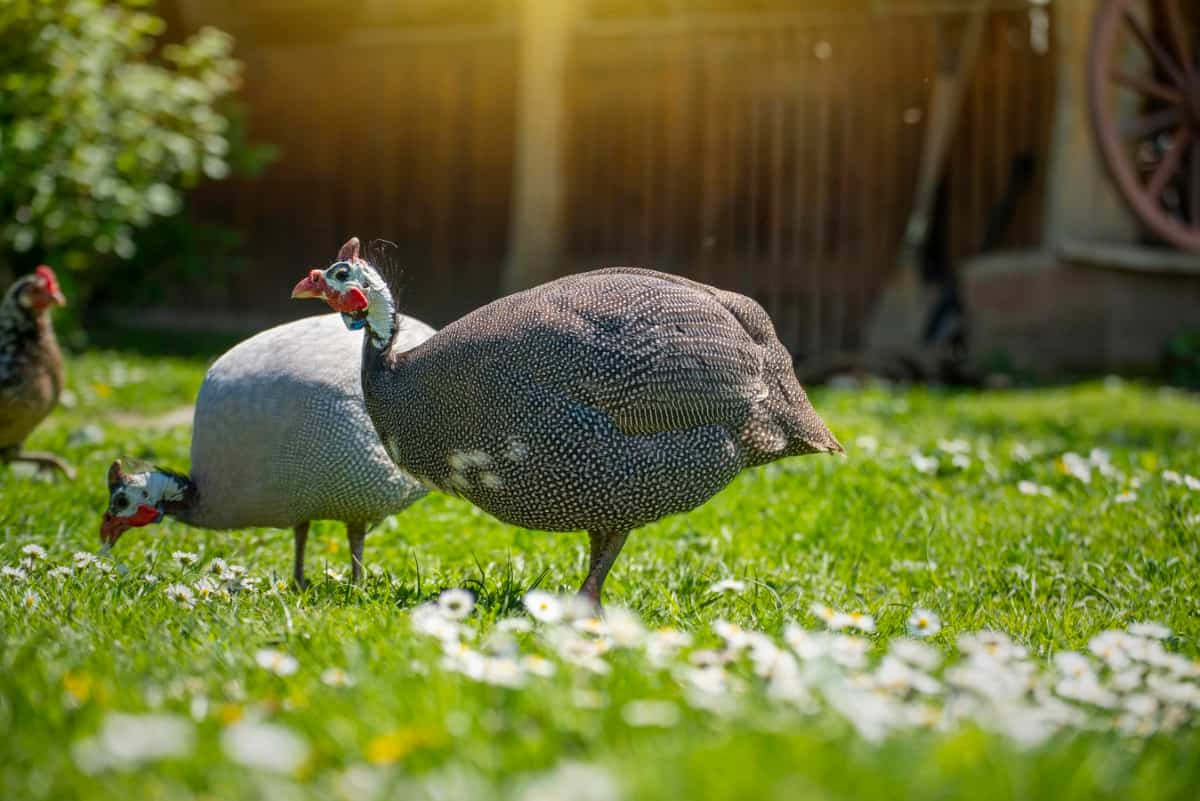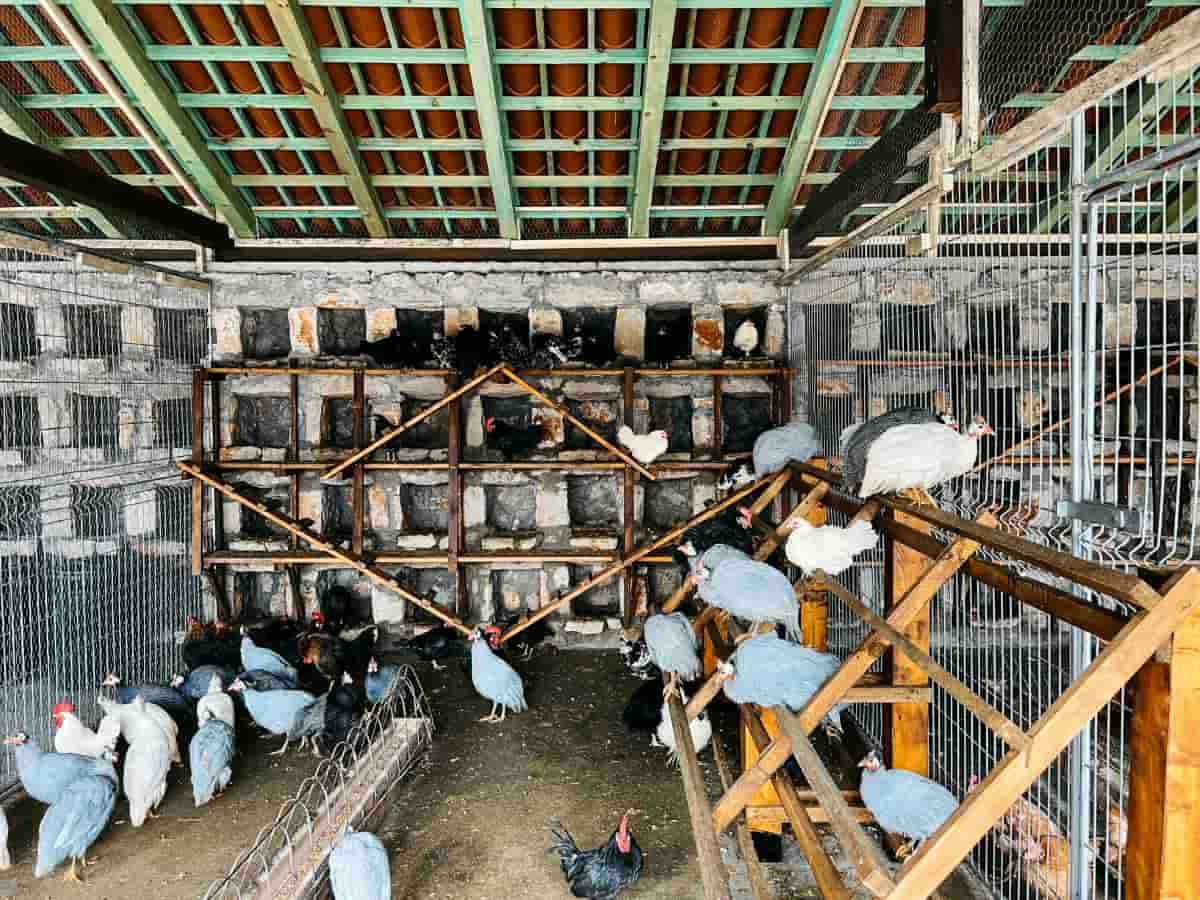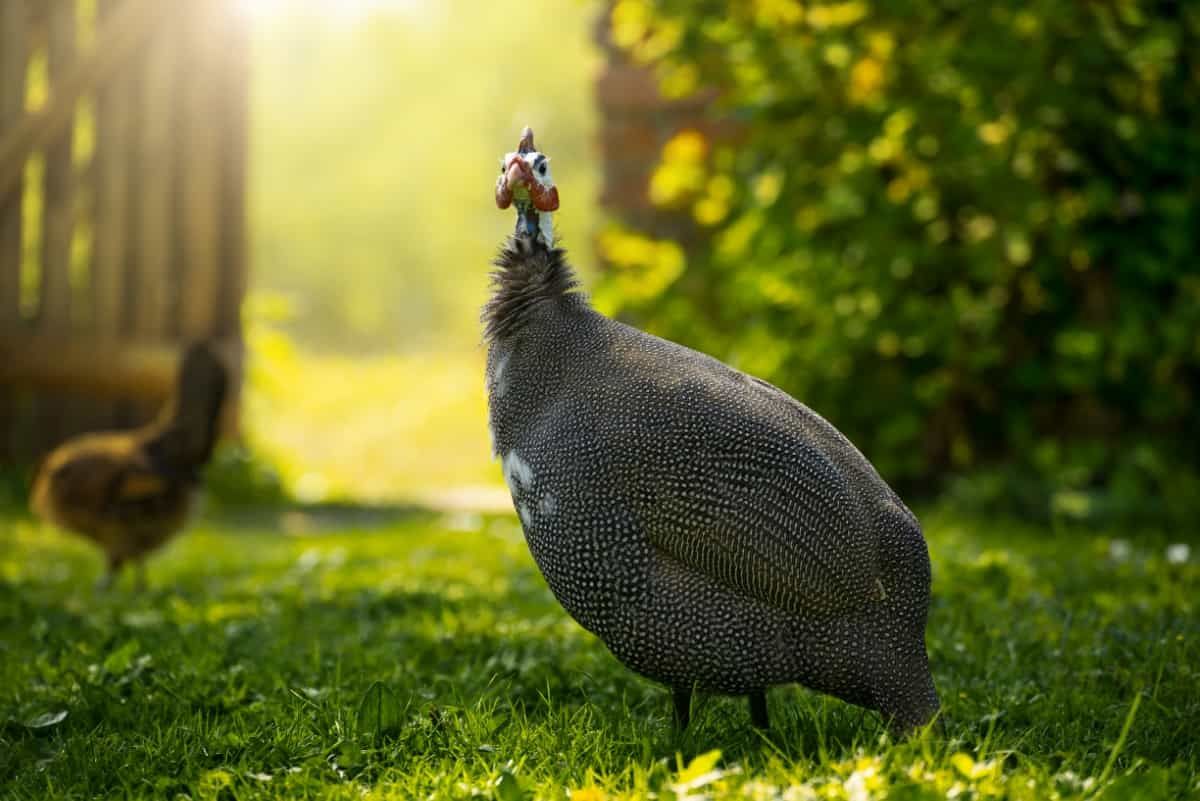In poultry keeping, it’s common for enthusiasts to explore diverse species, seeking to optimize their flock’s productivity, improve pest control, and enhance the overall dynamism of their poultry environment. This is where the idea of raising guinea fowl with chickens comes into play. This cohabitation brings about a fascinating balance in the poultry yard and provides a series of benefits and unique challenges. As intriguing as it sounds, one must acknowledge that it requires a thoughtful approach and thorough understanding.

Also, while discussing this subject, one cannot ignore the concept of the guinea fowl and chicken crossbreed, a topic that has been a point of interest for many poultry keepers. This comprehensive guide aims to provide all the information needed to understand and successfully manage this peculiar yet rewarding combination of guinea fowl and chickens.
How to Keep Guinea Fowl with Chickens
Guinea Fowl and Chickens Cohabitation Tips
Before embarking on this journey, it’s crucial to arm oneself with key cohabitation tips to ensure a smooth and harmonious living between the guinea fowl and chickens. Begin with understanding the unique characteristics of both species. Guinea fowl are known for their loud, protective behavior, and they roam more freely than chickens, while chickens are more domesticated, making them easier to manage in a contained space.
Providing ample space for both species is important to prevent overcrowding and encourage natural behaviors. Introducing guinea fowl to chickens at a young age helps them learn to cohabitate peacefully. Carefully monitoring their interactions, particularly during the initial stages, can prevent potential conflicts.
Benefits of Raising Guinea Fowl and Chickens Together
A balanced cohabitation between guinea fowl and chickens offers several benefits. Firstly, guinea fowl are excellent tick and insect controllers. They devour ticks, fleas, beetles, and even rodents that can pose a risk to chickens. Secondly, their loud behavior serves as an alarm system against predators, protecting themselves and the chicken flock. Another benefit is increased productivity.
Guinea fowl produce lean, high-protein meat and nutrient-rich eggs that can be a great addition to the regular output of chickens. Additionally, their cohabitation can facilitate crossbreeding, potentially leading to the development of unique hybrids with desired traits, adding to the diversity and resilience of the flock.
How to Introduce Guinea Fowl to an Existing Chicken Flock
Introducing guinea fowl to an existing chicken flock requires patience and care. Integrating guinea fowl as keets (young guinea fowl) is recommended since they are more adaptable and can easily become familiar with the chickens as they grow. Start by introducing them in a separate but visible pen so that both species can observe each other without direct contact. This approach minimizes territorial disputes and helps each group become comfortable with the presence of the other. Gradually allow supervised interactions before fully integrating them.
Managing the Pecking Order: Guinea Fowl and Chicken Dynamics
A pecking order is established in every poultry flock, denoting the birds’ social hierarchy. This unavoidable hierarchy can create issues when introducing a new species. Being more aggressive and assertive, Guinea fowl are likely to dominate this order. Therefore, ensuring the chicken flock is not dominated or bullied excessively is essential. Regularly observing their interactions is crucial in maintaining a balanced and peaceful coexistence.
In case you missed it: How to Raise Chicken and Quail Together: A Comprehensive Guide

Feeding Requirements for Guinea Fowl and Chickens
Guinea fowl and chickens share similar dietary requirements, simplifying the feeding process. Both species require a diet rich in protein, vitamins, and minerals. Layer feed, grain mixes, and kitchen scraps provide the necessary nutrients. However, guinea fowl require a slightly higher protein content, especially during their growth stage. One can manage this by supplementing their diet with high-protein feed or treats like mealworms or black soldier fly larvae. It’s also important to ensure each species can access food and water without competition or conflict.
Housing Considerations for Mixed Flocks of Guinea Fowl and Chickens
A mixed flock requires careful housing considerations to cater to both guinea fowl and chickens’ unique needs. The coop should be spacious enough to accommodate both species comfortably. Guinea fowl prefer roosting in high places, so consider adding higher roosting bars in the coop. While chickens are quite content within the coop, guinea fowl have a strong instinct to roam and fly.
Therefore, providing a large, secure outdoor space for them to express these natural behaviors is a good idea. Both species need a secure and warm place to nest. While chickens readily use nesting boxes, guinea fowl prefer ground-level, secluded spots for laying eggs.
Protecting Guinea Fowl and Chickens from Predators
One of the primary responsibilities of any poultry keeper is to ensure the flock’s safety from predators. Given their louder nature and keen senses, guinea fowl can act as an alarm system, warning the flock of incoming threats. However, this doesn’t eliminate the need for a safe and secure housing setup.
The coop and run should be fortified to prevent access to predators. Consider burying the fencing into the ground to deter digging predators and covering the run to shield from aerial threats. Regular inspection of the premises for potential predator signs can also go a long way in ensuring the flock’s safety.
Healthcare Practices for Guinea Fowl and Chickens
Healthcare practices play a critical role in maintaining the overall well-being and productivity of the flock. Both guinea fowl and chickens are susceptible to similar health issues, including parasitic infections, respiratory diseases, and nutritional deficiencies. Regular health checks, a balanced diet, and maintaining hygiene within the coop and run can help prevent most of these problems. Vaccinations are also necessary, particularly for diseases like Marek’s and Newcastle’s. In case of noticeable health issues, isolating the affected bird and seeking veterinary advice promptly is recommended.
Common Challenges of Keeping Guinea Fowl and Chickens Together
While keeping guinea fowl with chickens has numerous benefits, it’s not without challenges. The main concern is the difference in behavior and temperament between the two species. Guinea fowl are more aggressive, active, and vocal than chickens, which can lead to conflicts.
In case you missed it: How to Introduce Dogs to Your Chickens: A Step-By-Step Guide

Ensuring a peaceful coexistence requires careful management of the flock dynamics and constant monitoring of their interactions. Another challenge is breeding, especially in the context of the guinea fowl and chicken crossbreed. While hybridization between guinea fowl and chickens can occur, it’s rare and often results in infertile offspring.
Conclusion
Raising guinea fowl with chickens can be a fascinating endeavor that adds diversity and resilience to your poultry flock. Understanding and respecting both species’ unique behaviors, needs, and contributions is the key to successful cohabitation. With careful management and patience, you can enjoy the many benefits this diverse flock offers.
- Ultimate Guide to Ossabaw Island Hog: Breeding, Raising, Diet, and Care
- Ultimate Guide to Juliana Pig: Raising Facts, Size, Diet, Care, and Lifespan
- Raising Lleyn Sheep: Disadvantages, Price, Uses, Characteristics, and Care
- Ultimate Guide to Meishan Pig: Breed Facts, Breeding, Raising, and Care
- Ultimate Guide to Teacup Pigs: Raising, Diet, Lifespan, Cost, and Care
- Guide to Raising Poll Dorset Sheep: Facts, Profile, Characteristics, Uses, and Care
- Ultimate Guide to Bighorn Sheep: Characteristics, Diet, Lifespan, Breeding, and Lifecycle
- Ultimate Guide to Raising Katahdin Sheep: Farming Facts, Breed Profile, Uses, and Care
- Ultimate Guide to Raising Oreo Cows: Belted Galloways Farming Facts, Profile, Uses, and Care